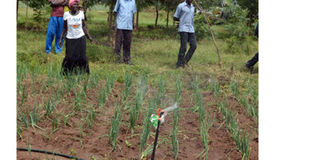How rural community is defeating climate change

Intervention. Farmers in a garden. American firm CTI Africa has pledged to give such farmers insurance offers. File photo
Tororo- To many farmers, any mention of weather patterns of 2015 and 2016 bring memories of horrible crop failures and starvation of animals.
The aforementioned years saw the country experience long dry spells in what scientists attributed to effects of climate change that left millions of farmers, including cultivators and herdsmen, in despair as their crops dried up and animals starved to death due to lack of pasture and water.
But as the country was drying up, one community in Kwapa Sub-county, Tororo District, was devising innovative means of how to confront the dry spells.
“We were in a dilemma; we had steady Kenyan market but producing throughout the year to meet the demand was impossible,” Mr Joseph Awala, an onions and chili farmer, says.
Forming an association
“We formed a group; Kwapa Farmers Association through which we had ideas of being able to bargain for fair prices of commodities but also lobby for an irrigation scheme,” Mr Awala, who was elected the association chairperson, adds.
That dream came to pass when they registered the association as a cooperative in 2014.
With the cooperative came a Belgium NGO VECO East Africa that setup an irrigation scheme at Shs450m last year.
The cooperative has 40 groups comprising 30 members each, who now grow vegetables, including onions and chili throughout the year courtesy of the irrigation schemes.
Mr Ben Ejakat, a resident of Kwapa and a member of the cooperative, says they now guard River Aderema, their solo source of water for irrigation, jealously.
“We mobilised some money to pay a guard who protects the reservoir from pollution. This water source is the reason we can irrigate our crops,” Mr Ejakat says.
The river gets its water from Mt Elgon, though upstream, the river is facing heavy degradation from cultivators and settlers.
Under the UN Paris climate change agreement (COP21) held in France in 2015, rich countries committed to helping developing countries cope with effects of climate change such as long dry spells, flooding and high temperatures. The world under the said agreement also agreed to reduce emissions and keep annual global temperature rise below two degrees centigrade above which humanity will be at risk.
It is from this agreement that Belgium NGO Veco East Africa, according to Mr Peter Businda, its agribusiness adviser, is giving back to poor communities like those in Kwapa as a way of financing adaptation and mitigation of climate change effects.
“You cannot talk about commercial agriculture now and depend on nature; climate change is real,” Mr Businda said.
Unreliable rainfall
Recently, Mr Richard Cong, the commissioner, water for agriculture in the Ministry of Water and Environment, said the viability of rainfall is becoming increasingly compromised by climate change, making rainfall patterns unpredictable and so are harvests.
This leaves the country, where more than 80 per cent of the population depends on agriculture, with limited options but to rather devise means of irrigating their crops.
Mr Cong says the ministry has finalised a countrywide rapid assessment of irrigation potential and requirements that will guide the country.
Mr Faluku Nakulopa, an engineer at Nsi Water Limited, an irrigation company, says irrigation is cheap in the long run although at the beginning, it looks expensive. Some irrigation systems for an acre of land can go for slightly above Shs2.5m.
The State minister for Agriculture, Mr Christopher Kibanzaga, said although agriculture is private-led, government has subsidised solar equipment to make setting up of irrigation systems a little cheaper since the country has already paid for the effects of climate change.




